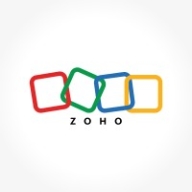

Oracle Fusion Service and Zoho CRM are two strong contenders in customer relationship management. Zoho CRM emerges as a more cost-effective and versatile option, especially favored for its adaptability and lower costs, making it fitting for startups and small businesses.
Features: Oracle Fusion Service is equipped with a comprehensive array of service management features, such as chat, customer portals, and co-browsing. It seamlessly integrates with knowledge bases and AI capabilities to improve customer interactions. Conversely, Zoho CRM offers customizable solutions for managing leads and tasks, with strong reporting and analytics at competitive prices. Users value Zoho’s customization options and integration capabilities with Zoho apps and external platforms.
Room for Improvement: Oracle Fusion Service requires enhanced user experience and customer support, as well as better integration with legacy systems and simpler licensing terms. Zoho CRM could benefit from improvements in its mobile app, email template, and automation capabilities, along with expanded social media integrations and a more intuitive rule engine.
Ease of Deployment and Customer Service: Both Oracle Fusion Service and Zoho CRM offer public and private cloud deployment models. Oracle often requires specialized deployment expertise, presenting industry-specific challenges. While its customer service can be complex, it is often superior at higher support levels. Zoho CRM provides quicker deployments and efficient customer support, though response times could be improved.
Pricing and ROI: Oracle Fusion Service generally involves higher upfront costs, justified for enterprises needing extensive functionalities. Its higher price can still yield substantial ROI through improved efficiencies. Zoho CRM provides low initial costs with flexible subscriptions, making it accessible for small and medium-sized enterprises, delivering effective ROI through its adaptability and utility.
Within CRM, I have worked on B2C service and sales extensively.
Sometimes the technical support is knowledgeable and helpful.
Customer service varies as sometimes I receive a good response, and other times I need to escalate issues and involve engineers from Oracle in an OWC session.
Sometimes, they don't understand what my actual needs are.
The 1.5 deduction from 10 is due to cultural communication differences based on where we're getting the support, as sometimes it takes a couple of times to communicate clearly enough for them to understand the issue.
There are multiple blogs and articles available online for self-help.
Initially, we had ten ERPs, and I have added more since.
Regarding scalability, the solution provides useful configurations that clients can utilize effectively.
The system is easy to understand, implement coding, and conduct training.
Zoho CRM is quite scalable; I have worked with clients who started with ten companies and have scaled up to managing 500 employees effectively within Zoho CRM.
The platform's global data centers across regions such as the US, EU, and India ensure data security and privacy through ISO certification and strong role-based security, which is essential for handling sensitive customer data.
If work continues for a long time without publishing, it tends to get corrupted, requiring deletion and rework from the ground up.
Zoho CRM guarantees 99% uptime, with downtime incidents being very rare.
I find Zoho CRM to be 100% stable and reliable as far as I know.
It is usually compliant with data regulation laws and is HIPAA compliant.
When dealing with bulk data uploads via a BDI process, some records occasionally fail, requiring me to debug and reprocess them.
Simpler integration capabilities.
It is currently restricted to Groovy scripting.
The platform does not save code versions similar to GitHub, where you can compare new versions with previous ones.
Some organizations may prefer not to have their data on the internet since Zoho CRM runs as a cloud service.
The main improvement needed for Zoho CRM is introducing SQL code for reports, similar to what's in Zoho Analytics.
Regarding licensing cost, according to each country's conditions, for Egypt, it's so expensive.
I think it's expensive, yet it does not pose a threat, making it costly for my enterprise.
Zoho CRM and all of Zoho's software are quite affordable because they are specifically designed for small and medium businesses.
In terms of my experience with the price and licensing cost, as with setup cost for Zoho CRM, it might not be quite affordable because there are cheaper solutions available.
The company has invested in ERP Cloud, and the seeded APIs and VIP features allow for customization using Groovy script.
Based on utilizing Groovy scripts and JavaScript, we can integrate with other external systems.
For HCM, it makes the life of users easier for self-service, payroll run, and applying tax according to the country, where different tax laws according to the country are very easy in Fusion.
The most valuable aspect of CRMs, including Zoho CRM, Salesforce, and Microsoft Dynamics, is automation capabilities.
The most valuable feature I have found in Zoho CRM is custom functions. You can achieve anything with it. From integrations with other applications, it is instant.
You can customize everything—what you sell, be it products, services, or projects.
| Product | Market Share (%) |
|---|---|
| Zoho CRM | 1.5% |
| Oracle Fusion Service | 0.9% |
| Other | 97.6% |


| Company Size | Count |
|---|---|
| Small Business | 9 |
| Midsize Enterprise | 6 |
| Large Enterprise | 22 |
| Company Size | Count |
|---|---|
| Small Business | 44 |
| Midsize Enterprise | 6 |
| Large Enterprise | 10 |
Zoho CRM empowers organizations with a complete customer relationship lifecycle management solution for managing organization-wide Sales, Marketing, Customer Support & Service and Inventory Management.
We monitor all CRM reviews to prevent fraudulent reviews and keep review quality high. We do not post reviews by company employees or direct competitors. We validate each review for authenticity via cross-reference with LinkedIn, and personal follow-up with the reviewer when necessary.